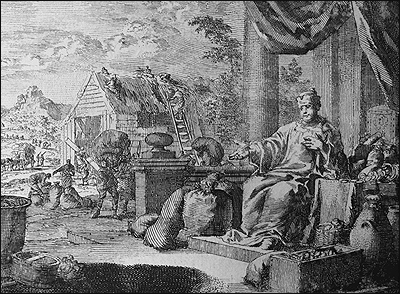
Home > Jesus > Parables of Jesus > Parable of the Rich Fool
 Parable of the Rich Fool
Parable of the Rich Fool
And He told them a parable, saying, “The land of a rich man was very productive. 17 And he began reasoning to himself, saying, ‘What shall I do, since I have no place to store my crops?’ 18 Then he said, ‘This is what I will do: I will tear down my barns and build larger ones, and there I will store all my grain and my goods. 19 And I will say to my soul, “Soul, you have many goods laid up for many years to come; take your ease, eat, drink and be merry.”’ 20 But God said to him, ‘You fool! This very night your soul is required of you; and now who will own what you have prepared?’ 21 So is the man who stores up treasure for himself, and is not rich toward God.” — Luke 12:16-21
The parable of the rich fool is a warning against covetousness and the accumulation of material wealth. It is found in Luke’s travel narrative, in which Christ and the disciples are trekking toward Jerusalem with an ever-expanding entourage in tow. Someone has just approached Jesus as if He were the typical rabbi, asking for arbitration between him and his brother in order to equitably divide the family inheritance. Jesus instead points out to the crowd the dangers of greed and faith in possessions, using the parable as an illustration.
The rich man in the story was blessed with a productive farming operation, so productive in fact that his yield has far exceeded his storage capacity. Rather than sharing his excess to help his fellow man and glorify God in the process, he decides to construct larger barns so he can stockpile all of it for himself. In the laying up of goods, he expects to be preparing a comfortable retirement. Unfortunately for him, death arrives that very night, rendering his material abundance useless and his eternal fate sealed. We do not know his redemptive state, but the indication isn’t good.
There is nothing wrong with having possessions and enjoying the good things that God provides, but it is very easy for a blessed earthly existence to distract one from God. Scripture warns repeatedly of dangers associated with a fixation on wealth, and Jesus Himself points out that it is difficult for the rich to enter heaven. The rich man in the parable provides such an example, trusting in his full silos and reassuring himself that his future is secure because of them. However we are not to place our faith in riches, but in God.
One may wonder what the problem is with storing up what is your own, but there is a difference in wise stewardship and selfish hoarding. In the precursor to the parable in verse 15 Jesus is specifically warning against greed, so the subsequent illustration of the rich man is to be taken as one of covetousness. Blessed by God with a wealth of resources, the man’s thoughts are only of using it to his own gain. Believers are to honor God with their first fruits and to use what blessings they receive to His purpose.
One cannot serve both God and wealth; you’re either going to be “rich toward God” or you’re just padding your own earthly account.
We also need to understand that everything—the ability to generate wealth included—comes from God and all things ultimately belong to Him. What He gives us stewardship over He does for a reason, a fact that would be wise for us to contemplate while remembering that to who is given more, more is expected.
Finally, there is also a lesson here about the pointlessness of earthly pursuits. In Ecclesiastes Solomon preaches candidly on the futility of human endeavor, and among the examples he highlights are the follies of riches and possessions. When God poses the question “now who will own what you have prepared?” to the man in the parable, it echoes Ecclesiastes 2:18-19 and reinforces the truth that you just can’t take it with you. The great conclusion Solomon eventually arrives at is that the only profitable thing for a man to do is to fear God and keep His commandments. Using our earthly resources to be rich toward God instead of indulging ourselves is a meaningful way to follow that scriptural advice.
How is one "rich toward God"? How can we apply material blessings to heavenly purpose? In part, as Paul advised Timothy in ministering to those "rich in this present world", through generosity and good deeds:
Instruct them to do good, to be rich in good works, to be generous and ready to share, storing up for themselves the treasure of a good foundation for the future, so that they may take hold of that which is life indeed. — 1 Timothy 6:18-19
Having concluded the parable, Jesus goes on to explain to believers that they need not worry about finances or provisions, because worrying nets nothing and God will always provide what is needed. Just as the ravens that neither sow nor reap, or the lilies that neither toil nor spin still receive their sustenance, so God will provide for His people as well. The knowledge of that truth should liberate believers to focus on His work to His glory. Toiling for riches and stockpiling our increase here on Earth is vanity. We should instead be storing up treasure in heaven, where neither moth nor rust destroys. Let us all consider where our treasure is kept.
Image:
Luyken, Jan (1649-1712); Parable of the Rich Man; Medhurst, Phillip (attribution)
Scripture Alone • Faith Alone • Grace Alone • Christ Alone • To the Glory of God Alone
Most scripture quotations taken from the New American Standard Bible® (NASB)